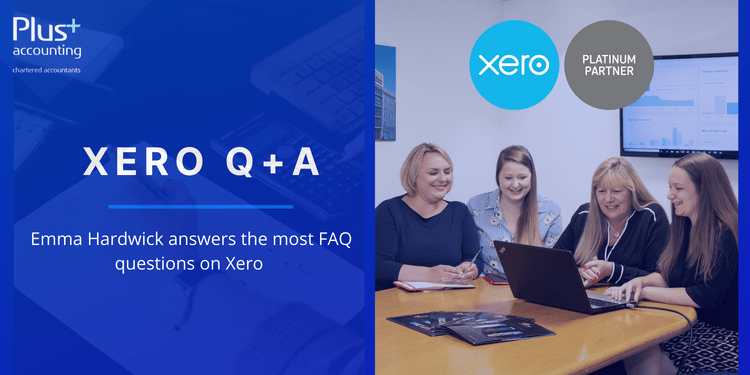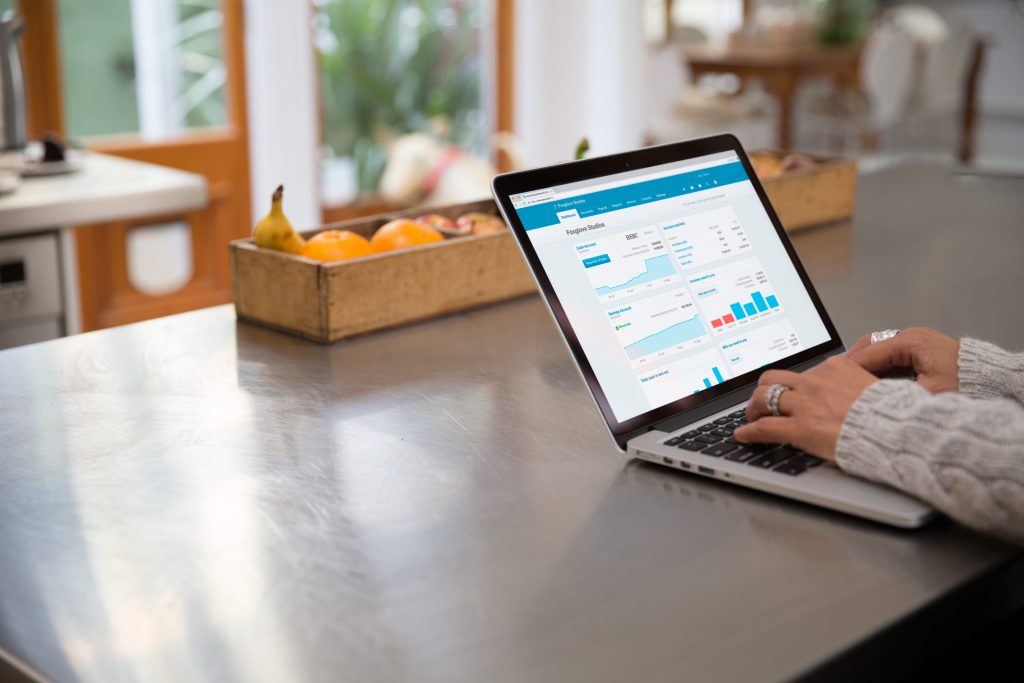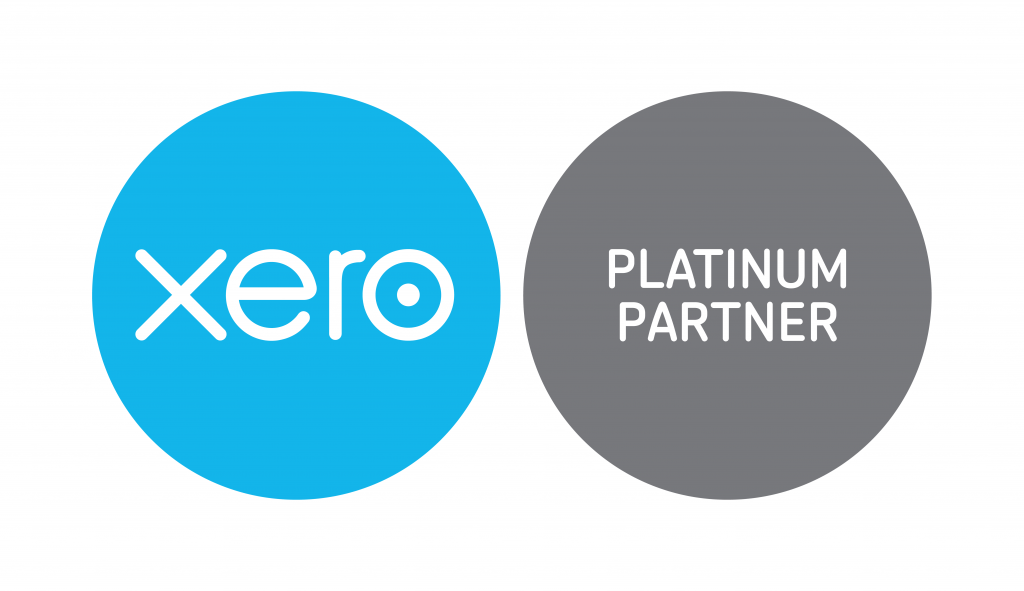1. What is Xero and how does it work?
Xero is a cloud based bookkeeping package that we love at Plus Accounting mainly due to the fact that our clients and our team can securely access their financials any time any where. You can gain access on any device via app or web browser as long as you have internet access.
It works by using your real-time data, such as bank feeds and sales invoicing to gain insights into your profits and keeping you compliant for submissions, such as your VAT return.
Xero will ensure your finances are always compliant and up to date, which in turn keeps not only your accountant happy, but also the tax man and most importantly you. You get all the standard book-keeping features you would expect from a book-keeping package and much more!
2. Why is Xero good for small businesses?
Xero is great for small businesses with its simple and clear layout, making it easy to keep the financial records up to date.
If you’re a start-up business or have no experience in financials, Xero is a great software to introduce you to book-keeping. Once your data is being maintained regularly, then the next step is having the ability to run standard or custom reports with just a few clicks. The reporting can then give you the foundations to make key business decisions.
3. 5 top reasons for using cloud accounting software?
One of our favourite features of Xero is ‘Tracking’, where you can track income and spend on any specific tag.
- 5 top reasons for using cloud accounting software?
- Access any time, any where to your financials on web browsers and mobile devices.
- API connections with other products, such as online banking and HMRC.
- Innovation of new features straight into the software, with no need to pay for upgrades.
- Safely secured in the cloud, no loss of data compared to desktop competitors.
- Monthly subscriptions for ease of cashflow and cancellation.
4. Should my business use cloud accounting software?
Using software in the cloud is great for many reasons, it is good if you have team members in multiple locations and if you want your accountant to have easy access to your data. By having your accounting software in the cloud, it will open you to further benefits of integrating with other software packages, such as Customer Management, Timesheets, and Receipt Scanning Tools.
However, some cloud packages are not always suitable for all businesses, and ensuring you have a set up to suit all your specific needs is always recommended.
5. How can cloud accounting benefit your small business?
For me, the top reason for using a cloud package is having the ability to allow your accountant and advisors access to your live data, where you can have those important reports prepared and shared without having to obtain backups. Also, if you need assistance in postings, your accountant can log in and view the issues and assist on the live data with you.
There is a great range of cloud accounting software on the market, from free packages to top end packages, however we have found from the beginning that Xero was our favourite with its innovative bank feeds and auto suggestion features, and its flexibility to use as little or all of the features without overpowering the dashboard and menu contents.
6. 10 things you need to do when setting up Xero
7. Which online accounting software is best?
In the current climate there are many options on the market, which are a good fit for start-up businesses through to established companies. I think there are some big must-haves in an accounting software and they are:-
- Have a direct link to your online banking.
- Automated suggesting / remembering items for next time.
- Making Tax Digital (MTD) compatible.
- Sends invoices out to your customers.
- Links with receipt scanning tools.
- Has a mobile app version.
- Easy to use and amend transactions.
- Ability to track departments or project profits.
With these in mind, my preferred accounting software is Xero. It is always innovative and has easy to use features.
8. What can Xero do for my business?
Xero can give you back the time to run your business, the hours the system has already saved our clients is huge. The automation and ease of use means that our clients can reconcile and send invoices on the go, anytime, anywhere.
Having your financials at your fingertips can ensure you know what profit you are making and where your business spend is going.
The automation features within Xero can save you time in the following top areas:
- In Invoicing, such as copying from quotes, previous invoices or even setting up repeat templates can save a lot of time on data entry
- In the Bank Feed, it suggests invoices you may have received or you are paying
- In the Bank Feed, it also recognises and remembers over time the previous posting of regular items, again saving a lot of time on data entry
- In Purchases, if you integrate Hubdoc or Dext (receipt scanning tools) then you can save even more time. These additional apps take a photo or upload a document and can then extract the relevant information, ready for approving. The extracted information includes supplier, dates, totals and VAT amounts. The app also then saves a digital copy of the receipt to the transaction, ready for approval – all in one easy place!
Having a cloud package means that you can have access to areas of your business data when you are on the move, such as outstanding sales invoices lists. These are flagged red when they are overdue, a nice indication if they need your action.
You can have multiple user access with different levels, therefore this could give you the opportunity to delegate some of the data entry between different team members. The custom user access means you can limit what some staff see if this concerns you.
9. How easy is it to switch to Xero?
It is easy to switch to Xero if you follow some main steps, but deciding what you wish to do with your historical data is something to bare in mind. If you are with another platform such as Sage or Quickbook, Xero suggests Movemybooks to assist moving over up to 2 years worth of data for free. Alternatively switching with an opening position is always the easiest as you just need 3 things:-
- Trial balance at the date before the switch,
- List of sales invoices and purchase invoices outstanding at the date before the switch,
- Export of contact details (if you wish to import this in i.e. customer lists)
There are a few other various things to consider when switching and your VAT returns will be an area of concern. You will need to ensure the data when switching provides a nice cut off, or you know what items you may need to upload on to your next return so nothing is missed.
If you are looking to switch from another software it’s always good to get some advice from an Advisor and I would be happy to help support this beneficial move for your business.
Author: Emma Hardwick, Plus Advisory Manager, Plus Accounting
Any views or opinions represented in this blog are personal, belong solely to the blog owner and do not represent those of Plus Accounting. All content provided on this blog is for informational purposes only. The owner of this blog makes no representations as to the accuracy or completeness of any information on this site or found by following any link on this site.
Published: 5 July 2021






